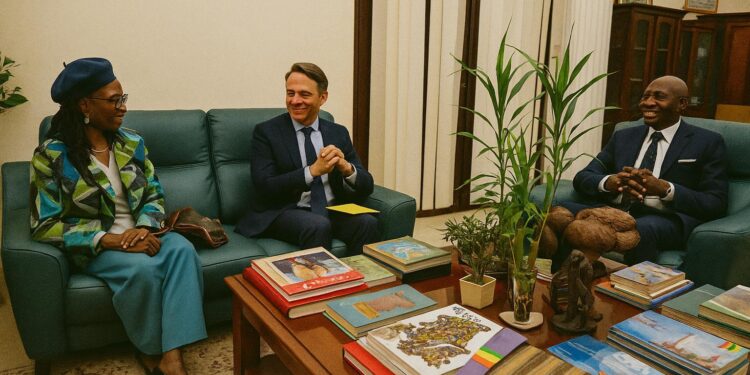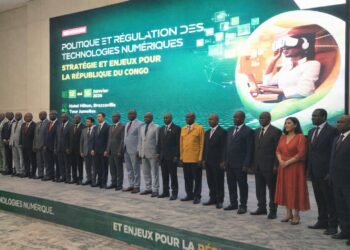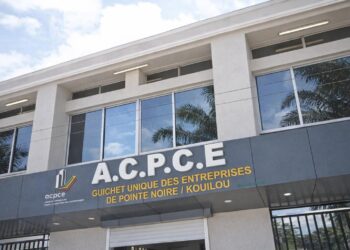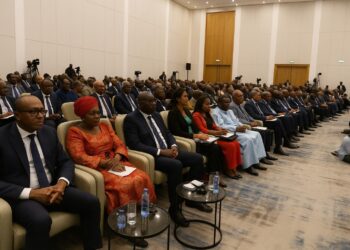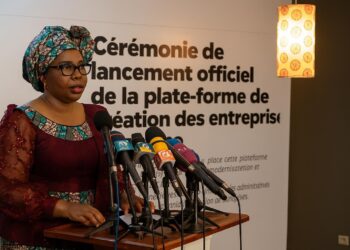Diplomatic overture meets digital ambition
When Ambassador Enrico Nunziata crossed the marble threshold of the Ministry of Posts, Telecommunications and the Digital Economy in Brazzaville in late July, the ceremonial pleasantries masked an unspoken urgency. Congo-Brazzaville, long focused on hydrocarbons, is seeking to diversify its economy, while Rome is intent on translating its renewed strategic interest in Africa into visible projects. In that intersection lies the memorandum of understanding inked on 16 June, a text that transforms political goodwill into a roadmap for fibre-optic backbones, coding bootcamps and an embryonic artificial-intelligence ecosystem.
Plan Mattei: from oil wells to algorithms
Announced by Prime Minister Giorgia Meloni last year, Plan Mattei has been portrayed in Rome as a shift from extractive logics toward mutually beneficial growth (Italian Ministry of Foreign Affairs 2024). The programme sets a bold target of supporting up to 500 000 African start-ups within a decade. Choosing Congo as one of the first laboratories is geopolitically significant: the country offers relative political stability, a burgeoning youth population and an under-explored digital market. For President Denis Sassou Nguesso, the initiative dovetails with the national ‘Congo Digital 2025’ strategy, which emphasises infrastructure resilience and local content production.
UNDP stewardship and calibrated risk management
The United Nations Development Programme has inserted itself as technical arbiter, a role welcomed by all sides. According to Resident Representative Adama Dian Barry, the agency will recruit an international consultancy before month-end to draft Congo’s first national AI framework. UNDP’s Digital Centre of Excellence in Rome will supply policy toolkits, while its Brazzaville office will monitor governance indicators (UNDP 2023). This layered oversight is designed to reduce typical pitfalls—pilot fatigue, data-privacy ambiguities and overlapping donor agendas—without diluting national ownership.
Seeding a start-up ecosystem along the Congo River
Minister Léon Juste Ibombo, a familiar figure in continental tech forums, insists that the memorandum is more than a statement of intent. He speaks of dedicated co-working spaces in Brazzaville and Pointe-Noire, tax incentives for early-stage investors and a sovereign innovation fund under consideration at the Ministry of Finance. Italy’s Cassa Depositi e Prestiti is reviewing blended-finance instruments, while universities in Milan and Padua have offered exchange slots for Congolese engineering graduates. If these strands coalesce, the banks of the Congo River could see the emergence of health-tech and logistics ventures able to attract regional capital.
Sectoral dividends: from tele-medicine to smart cassava
Health is the low-hanging fruit. Congo spends roughly 3 percent of GDP on public health, and digital triage tools could stretch scarce resources. Italian firms specialised in tele-radiology are already conducting feasibility studies with the Ministry of Health. Agriculture follows closely: AI-driven weather forecasting and pest-diagnostics applications promise gains for cassava and cocoa yields, sectors flagged as employment multipliers by the African Development Bank (AfDB 2022). The often-overlooked logistics chain is also under scrutiny; predictive analytics for port traffic in Pointe-Noire could shave days off export timelines, a metric donors value as evidence of systemic impact.
Navigating sovereignty and interdependence
Digital partnerships in Africa can trigger anxiety over data sovereignty. Brazzaville’s policymakers, mindful of precedents elsewhere on the continent, are drafting localisation clauses that require sensitive datasets—medical records, biometric IDs—to reside on Congolese soil. Italian negotiators appear willing to accommodate such provisions, quoting the EU’s own General Data Protection Regulation as a reference point. Analysts at the African Union’s specialised agency, Smart Africa, view this symmetry as a litmus test for future North–South digital accords in which respect for domestic regulation becomes a competitive advantage rather than a constraint.
Outlook: pragmatic optimism amid a polycrisis era
Neither side underestimates the structural hurdles: intermittent electricity, still-limited broadband penetration, and the perennial challenge of translating pilot projects into scalable businesses. Yet the combined political capital of Rome, the convening power of UNDP and Brazzaville’s quest for diversification create an enabling environment that was absent a decade ago. As Ambassador Nunziata remarked, “Our goal is to seed sustainable digital value chains that will outlive any single government cycle.” In a world where geopolitical rivalries increasingly play out in the digital arena, the Congo–Italy axis offers a reminder that cooperative statecraft and market pragmatism can still converge.

































